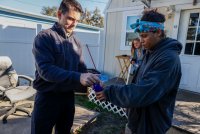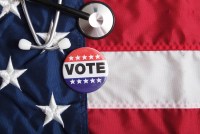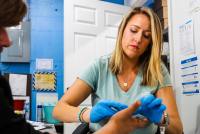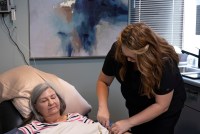Latest KFF Health News Stories
What the Health? From KFF Health News: Arizona Turns Back the Clock on Abortion Access
A week after the Florida Supreme Court said the state could enforce an abortion ban passed in 2023, the Arizona Supreme Court ruled that state could enforce a near-total ban passed in 1864 — over a half-century before Arizona became a state. The move further scrambled the abortion issue for Republicans and posed an immediate quandary for former President Donald Trump, who has been seeking an elusive middle ground in the polarized debate. Alice Miranda Ollstein of Politico, Rachel Cohrs Zhang of Stat, and Rachel Roubein of The Washington Post join KFF Health News’ Julie Rovner to discuss these stories and more. Also this week, Rovner interviews KFF Health News’ Molly Castle Work, who reported and wrote the latest KFF Health News-NPR “Bill of the Month” feature, about an air-ambulance ride for an infant with RSV that his insurer deemed not medically necessary.
Becerra Joins the Fray Over Reproductive Rights
Health and Human Services Secretary Xavier Becerra is racking up frequent-flier miles as he hopscotches the country to highlight health issues the White House hopes will become pivotal for voters this year — none more so than reproductive rights. “No woman today should fear [not having] access to the care that she needs. President Biden […]
Rising Complaints of Unauthorized Obamacare Plan-Switching and Sign-Ups Trigger Concern
Federal and state regulators are mulling what they can do to thwart this growing problem.
What the Health? From KFF Health News: Florida Limits Abortion — For Now
The Florida Supreme Court handed down dual abortion rulings this week. One said voters will be allowed to decide in November whether to create a state right to abortion. The other ruling, though, allows a 15-week ban to take effect immediately — before an even more sweeping, six-week ban replaces it in May. Meanwhile, President Joe Biden is doubling down on his administration’s health care accomplishments as he kicks off his general election campaign. Lauren Weber of The Washington Post, Joanne Kenen of the Johns Hopkins University schools of nursing and public health, and Tami Luhby of CNN join KFF Health News’ Julie Rovner to discuss these stories and more. Also this week, Rovner interviews health care analyst Jeff Goldsmith about the growing size and influence of UnitedHealth Group in the wake of the Change Healthcare hack.
ACA Plans Are Being Switched Without Enrollees’ OK
Insurance agents say it’s too easy to access consumer information on the Affordable Care Act federal marketplace. Policyholders can lose their doctors and access to prescriptions. Some end up owing back taxes.
Hospitals Cash In on a Private Equity-Backed Trend: Concierge Physician Care
Hospitals are increasingly stretching a velvet rope, offering “concierge service” to an affluent clientele. Critics say the practice exacerbates primary care shortages.
A Paramedic Was Skeptical About This Rx for Stopping Repeat Opioid Overdoses. Then He Saw It Help.
For years, addiction response teams have traveled around Florida to connect people who have overdosed with resources and recovery centers. Now, a handful have a new tool in their kit: buprenorphine, which can help prevent the cravings and withdrawal symptoms that lead to more drug use.
As money flows to abortion rights initiatives in states, some donors focus on where anger over the “Dobbs” ruling could propel voter turnout and spur Democratic victories up and down the ballot, including in key Senate races and the White House.
GOP-Led States Expand Crackdowns on Transgender Care
South Carolina’s legislature is poised to pass a bill prohibiting doctors from offering some health-care services to transgender minors — part of a new wave of anti-trans legislation from Republican-led states. The South Carolina bill, which passed the state House of Representatives in January and is under consideration in the Senate, would bar health-care providers […]
Biden Team, UnitedHealth Struggle to Restore Paralyzed Billing Systems After Cyberattack
The cyberattack on a unit of UnitedHealth Group’s Optum division is the worst on the health care industry in U.S. history, hospitals say. Providers struggling to get paid for care say the response by the insurer and the Biden administration has been inadequate.
America Worries About Health Costs — And Voters Want to Hear From Biden and Republicans
The presidential election is likely to turn on the simple question of whether Americans want Donald Trump back in the White House. But health care tops the list of household financial worries for adults from both parties.
What the Health? From KFF Health News: Alabama’s IVF Ruling Still Making Waves
Lawmakers in Congress and state legislatures are scrambling to react to the ruling by the Alabama Supreme Court that frozen embryos created for in vitro fertilization are legally children. Abortion opponents are divided among themselves, with some supporting full “personhood” for fertilized eggs, while others support IVF as a moral way to have children. Rachel Cohrs of Stat, Riley Griffin of Bloomberg News, and Joanne Kenen of the Johns Hopkins University schools of nursing and public health and Politico Magazine join KFF Health News’ Julie Rovner to discuss these issues and more. Also this week, Rovner interviews University of Pittsburgh law professor Greer Donley, who explains how a 150-year-old anti-vice law that’s still on the books could be used to ban abortion nationwide. Plus, for “extra credit,” the panelists suggest health policy stories they read this week that they think you should read, too.
Mezcla letal: se extiende el uso de fentanilo con sedantes para caballos
La xilacina se utiliza para sedar a los caballos. Ahora la están mezclando con fentanilo. Es letal y la naloxona no frena las sobredosis.
Horse Sedative Use Among Humans Spreads in Deadly Mixture of ‘Tranq’ and Fentanyl
Illegal supplies of fentanyl are being cut with xylazine, a powerful horse tranquilizer. Overdoses involving this veterinary sedative are growing nationally and now Florida officials are tracking the deaths.
Brote de sarampión: Florida dice que niños no vacunados pueden ir a la escuela, desafiando a los CDC
La mayoría de las personas que no están protegidas por una vacuna contraerán sarampión si se exponen al virus. Existe riesgo de muerte.
The state’s surgeon general grants parents permission to send unvaccinated children to school during a measles outbreak, risking their health and that of others.
Southern Lawmakers Rethink Long-Standing Opposition to Medicaid Expansion
While many Republican state lawmakers remain firmly against Medicaid expansion, some key leaders in holdout states are showing a willingness to reconsider. Public opinion, financial incentives, and widening health care needs make resistance harder.
For the first time, a jury has convicted a parent of a school shooter of charges related to the child’s crime, finding a mother in Michigan guilty of involuntary manslaughter and possibly opening a new legal avenue for gun control advocates. Meanwhile, as the Supreme Court prepares to hear a case challenging the FDA’s approval of the abortion drug mifepristone, a medical publisher has retracted some of the journal studies that lower-court judges relied on in their decisions. Alice Miranda Ollstein of Politico, Sarah Karlin-Smith of the Pink Sheet, and Rachana Pradhan of KFF Health News join KFF Health News’ Julie Rovner to discuss these issues and more. Plus, for “extra credit,” the panelists suggest health policy stories they read this week that they think you should read, too.
More ‘Navigators’ Are Helping Women Travel to Have Abortions
After the U.S. Supreme Court ended the federal right to an abortion and many states banned the procedure, reproductive health care organizations hired dozens of people to help patients arrange travel and pay for care.
Ketamine Therapy for Mental Health a ‘Wild West’ for Doctors and Patients
Ketamine, approved by the FDA as an anesthetic in 1970, is emerging as a major alternative mental health treatment, and there are now more than 500 ketamine clinics around the country. But with little regulation and widely varying treatment protocols, it’s a medical “wild West.”




















